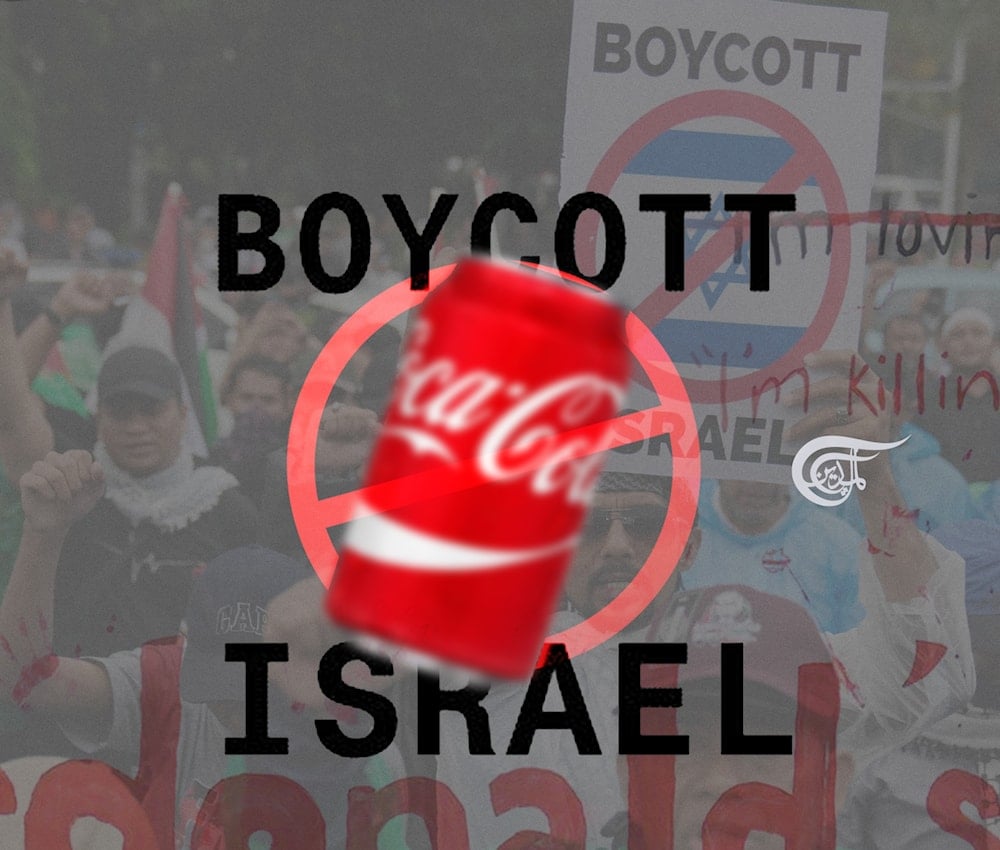The Impact of Consumer Boycotts on Rogue States and a Case for Expansion
In 2024, consumers in the Muslim world have boycotted brands such as Pepsi and Coke as a protest against the genocide of Gaza.
-

The Impact of Consumer Boycotts on Rogue States and a Case for Expansion (illustrated by Mahdi Rteil to Al Mayadeen English)
Consumer boycotts of Western brands such as Coca-Cola and Pepsi are now pronounced in Muslim-majority countries. These multimillion-dollar companies are witnessing a backlash over "Israel’s" relentless genocide and crimes against humanity which are seen as being abetted by the United States and is unacceptable. The consumer boycotts which impact revenue generation and US tax payer money used to fund weapon sales to the genocidal regime have dealt a blow to mighty soda companies who have spent decades shoring up demand and penetrating Muslim majority markets. While this is a commendable step by the Muslim public to economically pressurize corporations, such measures need to be institutionalized and universalized to have a tangible impact.
The Impact of Consumer Boycotts
Consumer boycotts have a long history. It dates back to the 18th century, when British and American Quakers launched an extensive propaganda campaign against slavery and slave labor products from domestic companies. The efforts resulted in a decline of revenue for companies and governments while a similar boycott put economic pressure on the white minority government in South Africa in the form of the Boycott Movement of 1959. The movement persuaded shoppers to not purchase goods from white only shops. In terms of impact, both boycotts did not dismantle the apartheid system in South Africa or the prevalence of slavery in the United States, alone. On slavery, it raised awareness on the individuals’ connection with God and the choices they make in the marketplace. In South Africa’s case, the boycott became an enabling factor and made its mark with average South Africans witnessing a significant repudiation of their draconian set up.
For economic boycotts to become effective however, other factors such as the mobilization of anti-apartheid movements in universities across the United States in the 1980s forcing the hand of American businesses to go towards financial sanctions and divestment in South Africa must also be considered. It is hence important, that consumer boycotts are leveraged in a manner that tangible pressure is exerted on oppressive governments that are racist, discriminatory, and draconian in nature.
Consumer Boycotts and 'Israel'
In 2024, consumers in the Muslim world have boycotted brands such as Pepsi and Coke as a protest against the genocide of Gaza. It has had an impact where in the first half of 2024, western beverages (and potential taxpayers’ money to fuel Israel’s genocide) suffered a 7% decline in sales across the Middle East. Beyond the Middle East and North Africa (MENA) region are consumers in countries such as Pakistan where local beverage brands such as Cola Next and Pakola witnessed their sales soar to 12% of the beverage market in a country that is struggling economically. The boycotts also demonstrate that public sentiment in the Muslim world is directed at all brands, entities, and institutions that are alleged to have or established links with the genocidal regime in "Israel" through revenue generation. Overall, the global market share for Western soft drinks fell by 4% in 2024 which is significant as it is being spearheaded by a youth population that had previously played a key role in some of the soda industry’s fastest growth in years since 2008.
Yet the impact of consumer boycotts on "Israel" has been minimal. The Zionist military-industrial complex is supported by US Congress in the form of legislation allowing the clearing of $ 20 billion in military aid to conduct further atrocities in Gaza and the West Bank. While consumer boycotts do put pressure on multinational companies, other variables need to be addressed to complement anti-Israel" public sentiment. As what happened in South Africa and also in the United States, consumer boycotts should be treated as an enabling factor with other variables working in tandem to bring genocidal, racist regimes such as "Israel" on their knees.
Official Sanctioning and Across the Board Implementation
Public boycotts of brands such as Western soft drinks must be complimented with official legislation criminalizing the import, consumption, and purchase of entities and companies suspected of, or having established ties with the genocidal regime. This, however, is a significant challenge for the international community which includes the Middle East. Many Arab states, for example, are signatories to the Abraham Accords with established diplomatic relations with "Israel". They are inclined to let Western products be actively consumed by their local population in the absence of oversight and accountability.
Hence, there needs to be greater official oversight, penalties, and criminalization of consumers which can make the ban effective. Secondly, economically compelling "Israel" to withdraw from its genocide and end its occupation entails targeting other sectors of the Zionist regime’s economy such as Israeli settlements. The Israeli settlement enterprise is being funded by more than soft drink corporations which needs to be called out. Consumer boycotts in the Western world should target those corporations that are funding the Israeli settler enterprise and allowing it to continue with impunity. Recall, that West Bank tensions have been partly stirred by Zionist settler activity with many pro-settler campaigners serving as government ministers in the Netanyahu cabinet. As a result, targeting the pernicious effects of funneling millions of dollars into Israeli settlements is also important to consider when initiating consumer boycotts which should not be limited to soft drink companies alone.
Overall, the boycotts in the Muslim world are a step in the right direction but they have been tested before and need to be backed up with official criminalization.
It sends a message that support for "Israel" is unacceptable in the Muslim world and that other countries should follow suit.

 Hamzah Rifaat
Hamzah Rifaat
 6 Min Read
6 Min Read











